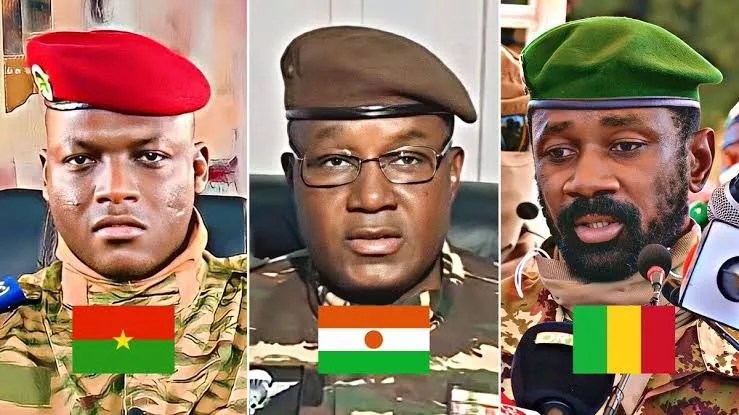
Niger, Mali, and Burkina Faso Solidify Break from ECOWAS, Form New Alliance

The military regimes of Niger, Mali, and Burkina Faso have officially marked their separation from the Economic Community of West African States (ECOWAS), establishing the Alliance of Sahel States (AES) in a historic summit held in Niamey, Niger.
According to reports, this move signifies a critical shift in regional dynamics as the three countries break away from traditional alliances.
Niger’s ruling General Abdourahamane Tiani emphasised the definitive nature of this break, stating,“Our people have irrevocably turned their backs on ECOWAS.”
His remarks came during the opening of the AES summit, where he addressed fellow leaders, Malian Colonel Assimi Goita and Burkinabe Captain Ibrahim Traore.
The formation of AES follows their withdrawal from ECOWAS in January, driven by accusations that the regional bloc was being manipulated by France and failing to support anti-jihadist efforts adequately.
General Tiani underscored AES’s commitment to combating terrorism, declaring it “the only effective sub-regional grouping in the fight against terrorism” and criticising ECOWAS for its perceived lack of involvement.
The AES has sought to distance itself from former colonial ruler France, expelling French troops and instead aligning with what they term “sincere partners” such as Russia, Turkey, and Iran.
The agenda of the summit included discussions on strengthening cooperation and intensifying the fight against jihadist violence that plagues the region.
Meanwhile, ECOWAS is set to hold its summit in Abuja, Nigeria, on Sunday, where the implications of the AES formation will be a crucial topic of discussion.
Leaders across West Africa are expected to deliberate on potential paths to reconciliation and the broader impacts on regional stability.
The AES summit, primarily a political event, demonstrated the solidarity and commitment of the three Sahelian leaders.
In March, AES announced joint anti-jihadist efforts, though specific details remain under wraps. The region, mainly the “three borders” area where Niger, Mali, and Burkina Faso converge, has seen relentless insurgent attacks despite extensive anti-jihadist military deployments.
The three nations have made sovereignty a cornerstone of their governance, with aspirations to create a common currency, moving away from the CFA franc shared with neighbouring countries.
However, experts warn that establishing a new currency is a complex and lengthy process requiring substantial political, technical, and financial preparations.
Earlier President of the ECOWAS Commission, Dr Omar Touray, had cautioned that the withdrawal of Mali, Burkina Faso, and Niger could have severe consequences.
He highlighted the potential loss of ECOWAS passports and the halting of ongoing projects worth over $500 million, including significant investments from the ECOWAS Bank for Reconstruction and Development.
Despite calls from leaders like Senegal’s President Bassirou Diomaye Faye and Mauritania’s President Mohamed Ould Cheikh El Ghazouani for reconciliation, the concurrent summits this weekend suggest an escalating rift between AES and ECOWAS.
About The Author
Related Articles
AES Condemns Niamey Airport Attack, Warns of Coordinated Destabilisation
The Alliance of Sahel States has strongly condemned the armed attack on...
ByWest Africa WeeklyFebruary 2, 2026Mali Cedes Strategic Land to Guinea to Deepen Trade Cooperation
Mali has approved the transfer of a strategic parcel of land to...
ByWest Africa WeeklyFebruary 2, 2026Senegal to Appeal CAF Sanctions After AFCON Final Controversy
Senegal has announced plans to formally appeal the sanctions imposed by the...
ByWest Africa WeeklyFebruary 2, 2026Burkina Faso Takes Legal Step Toward Nuclear Energy Development
Burkina Faso has voted to join the Vienna Convention on Civil Liability...
ByWest Africa WeeklyFebruary 2, 2026











